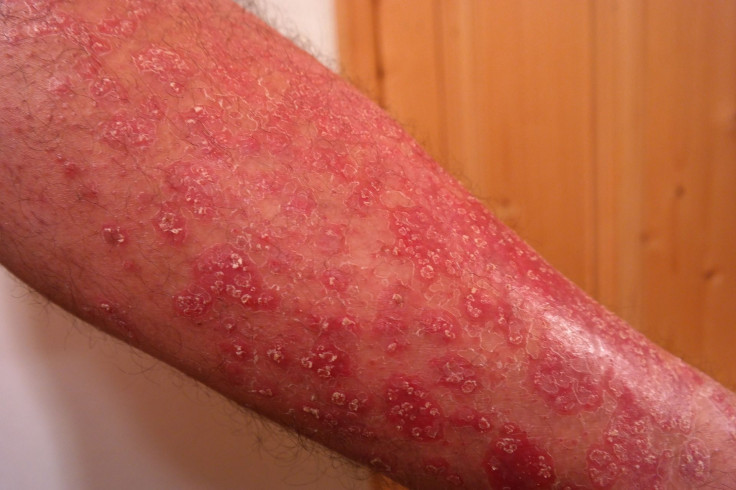Natural Psoriasis Treatments: Which Alternative Therapies Do And Don't Work

Psoriasis is a lifelong condition characterized by the rapid buildup of cells on the skin’s surface, which appear as thick, silvery scales, and painful, itchy red patches. The condition affects more than two million people in the United States who collectively pay over $11 billion each year in direct and indirect health care costs. A good portion of this money goes to treatments, the most popular of which are steroidal or nonsteroidal topical creams, which can help reduce redness and swelling. Other treatments include light therapy and various medications. Trying to figure out which of these work isn’t only costly, it’s time consuming.
To avoid these issues, many people have resorted to alternative therapies, which tend to be cheaper and sometimes just as effective. More than a third of Americans practice these treatments, which include dietary changes, herbal supplements, aromatherapy, and acupuncture. Sometimes they work and sometimes they don’t. Acupuncture, for example, has previously been used to treat skin rashes caused by dermatitis. Conversely, studies have found herbal supplements are often ineffective at treating conditions like erectile dysfunction — some don’t even contain the herbal ingredients on their labels.
When it comes to alternative therapies for psoriasis, the evidence is just as murky. Here are some treatments shown to soothe your skin and reduce symptoms, and a few you should use with caution.
Capsaicin
Capsaicin, the component that makes food spicy, has been show to help us lose weight. But it can also help ease psoriasis symptoms. According to a 2010 study, over-the-counter creams and ointments containing capsaicin were able to reduce redness, inflammation and scaling. It doesn’t even take much to work — only 0.025 to 0.075 percent capsaicin will do. In two other studies, researchers found daily application of capsaicin cream could relieve symptoms in as little as six weeks.
Turmeric
You might have had turmeric before, probably on a night when you ordered in some Indian or Thai food. But research has found the peppery, bitter, orange-colored spice does more than make food taste great; it also helps to reduce the potential for flare ups, which lead to extremely agitated skin and exacerbated symptoms. Take it as directed in supplement form, or use it in your food (3 grams per day is optimal).
Oregon Grape
Mahonia Aquifolium, a type of herb also known as Oregon grape, is normally used for stomach ulcers and other intestinal issues. But research has shown topical creams containing 10 percent Oregon grape can also help mild to moderate psoriasis. Sixty-three percent of patients involved in the study said it worked “equal to” or “better than” the standard psoriatic treatment, with 84 percent saying their psoriasis’ response to treatment was “good” or “excellent.” That said, this treatment should only be applied under a doctor’s supervision as it may cause additional itching or irritation.
Tea Tree Oil
Extracted from the leaves of a plant native to Australia, tea tree oil is normally used to treat acne or fungal infections. It’s supposed antiseptic qualities have led people to put it in their shampoos believing it will help ease psoriasis symptoms on the scalp, where topical creams are hard to apply. Unfortunately, when applied to the skin undiluted, tea tree oil can cause irritation and a burning sensation, something psoriasis patients would hope to avoid.
Oats
Some studies have proven oats can help soothe the itchiness of poison ivy — thanks in part to the breakfast food’s anti-inflammatory properties. While these properties have been utilized in several oatmeal-based moisturizers, their effect on psoriasis patients hasn’t been measured, and therefore it’s unclear whether they’d actually work.
Aloe
Used in its gel form, aloe vera is effective in relieving sunburns and treating ulcerative colitis. Though it may be a popular choice among psoriasis patients for the itchiness and burning associated with the condition, it might not be as effective as the Internet would have you believe. A 2005 study found that while it does have an effect, it’s not any better than a placebo treatment used over the same period. Also, don’t ingest it as a tablet, because that can be harmful to your health.



























